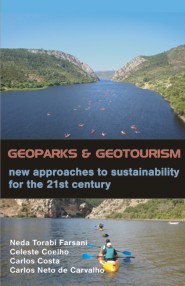
Geoparks and Geotourism
New Approaches to Sustainability for the 21st Century
by Neda Torabi Farsani, Celeste Coelho, Carlos Costa, & Carlos Neto de Carvalho (editors)
- Number of Pages: 207
- ISBN-10: 1612335519
- ISBN-13: 9781612335513
- Publisher: BrownWalker Press
- Year: 2011
- Category: Textbooks & Study Guides, Social Science
Synopsis
This book aims to identify geotourism and geoparks as gateways to socio-cultural, socio-environmental, and socio-economic sustainability in rural areas. At present, geotourism is a new movement helping travelers to increase their knowledge about natural resources, the cultural identities of host communities, and ways of preserving them. The ‘emerging tourism’ niche of geotourism is still at an early stage of commercial development in most countries, and geoparks as a sustainable development model for protected areas are pioneers in the development of geotourism marketing. The establishment of the European Geoparks Network and the Global Geoparks Network are positive steps toward the preservation and presentation of geo-heritage as a new tourist attraction.Geoparks and Geotourism provides an opportunity for students, professionals, and authorities of geoparks to take advantage of emerging techniques to create new products, facilities, services, technologies, and management practices for geoparks in the future. Consequently, the book is a paradigm for geoparks who want to come under the umbrella of the Global Geoparks Network. The numerous examples provided of geoparks currently attracting travelers may contribute to the creation of innovative strategies for sustainability and geoconservation in rural areas around the world.
About the Author
Neda Torabi Farsani is a PhD student in tourism management at the University of Aveiro, Portugal. She has a Master’s degree (2006) in Physical Geography from Azad University, Iran.Celeste Coelho is a Full Professor of Applied Environmental Sciences at the University of Aveiro, with a Ph.D. in Geography from the University of Aberdeen, U.K.
Carlos Costa is based at the University of Aveiro, Portugal, where he is Associate Professor, Leader of the PhD Programme and the Tourism Research Unit. He is also Editor of the Portuguese Tourism & Development Journal. He holds a PhD and MSc on Tourism Management (University of Surrey, UK).
Carlos Neto de Carvalho is the scientific coordinator of Geopark Naturtejo Meseta Meridional – European & Global Geopark under UNESCO, geologist of the Municipality of Idanha-a-Nova and researcher at the Center of Geology of the University of Lisbon





 View or Post a Review at Amazon.com
View or Post a Review at Amazon.com